- Home
- Michelle Hodkin
The Unbecoming of Mara Dyer md-1 Page 2
The Unbecoming of Mara Dyer md-1 Read online
Page 2
I couldn’t let that happen. I recommended moving instead.
I remembered the way my mother’s eyes narrowed when I brought it up a few days after the disastrous appointment. So wary. So cautious, like I was a bomb under her bed.
“I really think it will help,” I said, not believing that at all. But I had been nightmare-free for two nights, and the mirror episode I didn’t remember was apparently the only one. The psychologist was overreacting, just like my mother.
“Why do you think so?” My mother’s voice was casual and even, but her nails were still bitten down to the beds.
I tried to recall the mostly one-sided conversation I’d had with the psychologist.
“She was always in this house—I can’t look at anything without thinking about her. And if I go back to school, I’ll see her there, too. But I want to go back to school. I need to. I need to think about something else.”
“I’ll talk to your father about it,” she said, her eyes searching my face. I could see in every crease of her forehead, every tilt of her chin, that she didn’t understand how her daughter could have gotten here—how I could have snuck out of the house and ended up in the last place I should. She had asked me as much, but of course I had no answer.
I heard my brother’s voice out of nowhere. “I think it’s almost over,” Daniel said.
My heartbeat slowed as I looked up at my older brother. And as he predicted, the priest then asked us all to bow our heads and pray.
I shifted uncomfortably, the brittle grass crunching under my boots, and glanced at my mother. We weren’t religious and frankly, I wasn’t sure what to do. If there was some protocol for how to behave at your best friend’s funeral, I didn’t get the memo. But my mother tilted her head, her short black hair falling against her perfect skin as she appraised me, examined me, to see what I’d choose. I looked away.
After an eternity of seconds, heads lifted as if eager for it to be over, and the crowd dissolved. Daniel stood beside me while my classmates took turns telling me how sorry they were, promising to stay in touch after the move. I hadn’t been in school since the day of the accident, but some of them had come to visit me in the hospital. Probably just out of curiosity. No one asked me how it happened, and I was glad because I couldn’t tell them. I still didn’t know.
Squawking pierced the funeral’s hushed atmosphere as hundreds of black birds flew overhead in a rush of beating wings. They settled on a cluster of leafless trees that overlooked the parking lot. Even the trees were wearing black.
I faced my brother. “Didn’t you park under those crows?”
He nodded, and started walking to his car.
“Fabulous,” I said as I followed him. “Now we’re going to have to dodge crap from the whole flock.”
“Murder.”
I stopped. “What?”
Daniel turned around. “It’s called a murder of crows. Not a flock. And yes, we’re going to dodge avian fecal matter, unless you want to go with Mom and Dad?”
I smiled, relieved without knowing why. “Pass.”
“Thought so.”
Daniel waited for me and I was grateful for the escape. I glanced back to make sure my mother wasn’t watching. But she was busy talking to Rachel’s family, whom we’d known for years. It was too easy to forget that my parents were leaving everything behind too; my father’s law practice, my mother’s patients. And Joseph, though only twelve, accepted without much explanation that we were moving and agreed to leave his friends without complaint. When I thought about it, I knew I had won the family lottery. I made a mental note to behave more charitably toward my mother. After all, it wasn’t her fault we were leaving.
It was mine.
4
EIGHT WEEKS LATER
Miami, Florida
YOU’RE KILLING ME, MARA.”
“Give me a minute.” I squinted at the spider that stood between me and my breakfast banana. She and I were working out an arrangement. “Let me do it, then. We’re going to be late.” Daniel was getting his panties in a bunch at the thought. Mr. Perfect was always punctual.
“No. You’ll kill it.”
“And?”
“And then it will be dead.”
“And?”
“Just imagine it,” I spoke, my eyes never leaving my arachnid opponent. “The spider family bereft of their matriarch. Her spider children waiting in their web, watching for Mother for days on end before they realize she’s been murdered.”
“She?”
“Yes.” I tilted my head at the spider. “Her name is Roxanne.” “Of course it is. Take Roxanne outside before she meets the Op-Ed section of Joseph’s Wall Street Journal.”
I paused. “Why is our brother getting the Wall Street Journal?”
“He thinks it’s funny.”
I smiled. It was. I turned to stare at Roxanne, who had sidestepped an inch or two in response to Daniel’s threat. I held out the paper towel and reached for her, but recoiled involuntarily. For the past ten minutes, I’d been repeating this motion: reaching and withdrawing. I wanted to shepherd Roxanne to freedom, to deliver her from our kitchen and lead her to a land flowing with the blood of myriad flying insects. A land otherwise known as our backyard.
But it seemed I was not up to the task. I was still hungry, though, and wanted my banana. I reached for her again, my hand stuck in midair.
Daniel heaved a melodramatic sigh and stuck a cup in the microwave. He pressed a few buttons and the tray began revolving.
“You shouldn’t stand in front of the microwave.”
Daniel ignored me.
“You could get a brain tumor.”
“Is that a fact?” he asked.
“Do you want to find out?”
Daniel examined my hand, still suspended between my body and Roxanne’s, paralyzed. “Your level of neuroses will only find love in a made-for-TV movie.”
“Perhaps, but I’ll be tumorless. Don’t you want to be tumorless, Daniel?”
He reached into the pantry and withdrew a cereal bar. “Here,” he said, and tossed it at me, but lately I was useless before noon. It fell with a thud on the countertop beside me. Roxanne scurried away, and I lost track of her.
Daniel grabbed his keys and sauntered toward the front door. I followed him into the blinding sunlight, breakfastless.
“C’mon,” he said with false cheer. “Don’t tell me you aren’t psyched beyond belief for our first day of school.” He dodged the tiny lizards that scurried across the slate walkway of our new house. “Again.”
“I wonder if it’s snowing in Laurelton right now?”
“Probably. That, I won’t miss.”
Just when I thought it wasn’t possible to get any hotter, the interior of Daniel’s Civic proved me wrong. I choked on the heat and motioned for Daniel to open the window while I sputtered.
He looked at me strangely.
“What?”
“It’s not that hot.”
“I’m dying. You’re not dying?”
“No … it’s like seventy-two degrees.”
“Guess I’m not used to it yet,” I said. We’d moved to Florida only a few weeks ago, but I wouldn’t recognize my old life in a lineup. I hated this place.
Daniel’s eyebrows were still lifted, but he changed the subject. “You know, Mom was planning to drive you to school separately today.”
I groaned. I didn’t want to play the patient this morning. Or any morning, actually. I contemplated buying her knitting needles, or a watercolor set. She needed a hobby that didn’t involve hovering over me.
“Thanks for taking me instead.” I met Daniel’s eyes. “I mean it.”
“No problemo,” he said, and flashed a goofy smile before turning onto I-95 and into traffic.
My brother spent a large portion of the agonizingly slow drive to school banging his forehead on the steering wheel. We were late, and as we pulled into the full parking lot, there wasn’t a single student among the glossy luxury cars.
I reached behind me for Daniel’s neat and tidy backpack, which was positioned in the backseat like a passenger. I grabbed it for him and launched myself out of the car. We approached the elaborately scrolled iron gate of the Croyden Academy of the Arts and Sciences, our new institution of higher learning. A giant crest was wrought into the gate—a shield in the center with a thick band extending from the top right to the bottom left, separating it into halves. There was a knight’s helmet crowning the shield, and two lions on either side. The school looked oddly out of place, considering the run-down neighborhood.
“So, what I didn’t tell you is that Mom’s picking you up this afternoon,” Daniel said.
“Traitor,” I mumbled.
“I know. But I need to meet with one of the guidance counselors about my college applications and she’s only free after school today.”
“What’s the point? You know you’re going to get in everywhere.” “That is far from certain,” he said.
I squinted one of my eyes at Daniel.
“What are you doing?” he asked.
“This is me, giving you the side eye.” I continued to squint.
“Well, you look like you’re having a stroke. Anyway, Mom’s going to pick you up over there,” my brother said, pointing to a cul-de-sac on the other side of the campus. “Try to behave.”
I stifled a yawn. “It’s too early to be such an asshat, Daniel.”
“And watch your language. It’s unbecoming.”
“Who cares?” I lolled my head back as we walked, reading the names of illustrious Croyden alumni inscribed in the brick archway above our heads. Most were along the lines of Heathcliff Rotterdam III, Parker Preston XXVI, Annalise Bennet Von—
“I heard Joseph call someone that the other day. He’s picking it up from you.”
I laughed.
“It’s not funny,” Daniel said.
“Please. It’s just a word.”
He opened his mouth to respond when I heard Chopin emerge from his pocket. The sound of Chopin, not the actual Chopin, thank God.
Daniel picked up his phone and mouthed Mom to me, then pointed at the glass wall that housed the administration office of Croyden Academy.
“Go,” he said, and I did.
Without my brother distracting me, I was able to fully absorb the campus in its immaculate, overlandscaped splendor. Fat blades of emerald grass anchored the grounds, clipped within a millimeter of uniformity. A sprawling courtyard divided the campus into blooming, flower-framed quadrants. One section housed the gaudily becolumned library, another the cafeteria and windowless gymnasium. The classrooms and administration office dominated the last two quadrants. Open-air archways and brick paths connected the structures and led to a gurgling fountain in the center of the lawn.
I half-expected to see woodland creatures burst forth from the buildings and break into song. Everything about the place shrieked WE ARE PERFECT HERE AND YOU WILL BE TOO! No wonder my mother chose it.
I felt grossly underdressed in my T-shirt and jeans; uniforms were required at Croyden, but thanks to our late transfer ours hadn’t arrived yet. Switching from public school to private as a junior—and in the middle of the trimester, no less—would have been torment enough without the added insult of plaid skirts and kneesocks. But my mother was a snob, and didn’t trust the public schools in such a big city. And after everything that had happened in December, I was in no shape to argue coherently about it.
I picked up our schedules and maps from the school secretary and headed back outside as Daniel hung up the phone.
“How’s Mom?” I asked.
My brother half-shrugged. “Just checking in.” He looked over the paperwork for me. “We’ve missed first period so your first class is …” Daniel fumbled with the papers and declared, “Algebra II.”
Perfect. Just perfect.
His eyes scanned the open-air campus; the classroom doors led directly outside, like the structure of a motel. After a few seconds, Daniel pointed to the farther building.
“It should be there, on the other side of that corner. Listen,” he said, “I might not see you until lunch. Do you want to eat with me or something? I have to speak to the principal and the head of the music department but I can find you after—”
“No, it’s fine. I’ll be fine.”
“Really? Because there’s no one I’d rather eat mystery meat with.”
My brother smiled, but I could tell he was anxious. Daniel had kept a big-brotherly eye on me ever since I was released from the hospital, though he was less obvious about it, and therefore less irritating, than our mother. But as such, I had to work extra hard to reassure him that I would not crack today. I put on my best mask of adolescent ennui and wore it like armor as we approached the building.
“Really. I’m fine,” I said, rolling my eyes for effect. “Now go, before you fail out of high school and die poor and lonely.” I shoved him lightly, for emphasis, and we separated.
But as I walked away, my little facade started to crumble. How ridiculous. This wasn’t my first day of kindergarten, though it was my first day of school without Rachel … ever. But it was the first of many. I needed to get a grip. I swallowed back the ache that rose in my throat and tried to decipher my schedule:AP English, Ms. Leib, Room B35
Algebra II, Mr. Walsh, Room 264
American History, Mrs. McCreery, Room 4
Art, Mrs. Gallo, Room L
Spanish I, Ms. Morales, Room 213
Biology II, Mrs. Prieta, Annex
Hopeless. I wandered the path to the building and scanned the room numbers, but found the vending machines before I found my Algebra classroom. Four of them in a row, pushed up against the back of the building, facing a series of tiki huts that dotted the grounds. They reminded me that I’d skipped breakfast. I looked around. I was already late. A few more minutes couldn’t hurt.
I set the papers down on the ground and dug in my bag for change. But as I inserted one quarter in the machine, the other one I held in my hand fell. I bent to search for it, as I had only enough money to buy one thing. I finally found it, placed it in the machine, and clicked on the letter-number combination that would provide my salvation.
It stuck. Unbelievable.
I clicked the numbers again. Nothing. My M&M’s were trapped by the machine.
I grabbed the sides of the machine and tried to shake it. No dice. Then I kicked it. Still nothing.
I glared at the machine. “Let them out.” I punctuated my statement with a few more useless kicks.
“You have an anger-management problem.”
I whipped around at the sound of the warm, lilting British accent behind me.
The person it belonged to sat on the picnic table under the tiki hut. His general state of disarray was almost enough to distract me from his face. The boy—if he could be called that, looking like he belonged in college, not high school—wore Chucks with holes worn through, no laces. Slim charcoal pants and a white button-down shirt covered his lean, spare frame. His tie was loose, his cuffs were undone, and his blazer lay in a heap beside him as he lazily leaned back on the palms of his hands.
His strong jaw and chin were slightly scruffy, as though he hadn’t shaved in days, and his eyes looked gray in the shade. Strands of his dark chestnut hair stuck out every which way. Bedroom hair. He could be considered pale in comparison to everyone else I’d observed in Florida thus far, which is to say he wasn’t orange.
He was beautiful. And he was smiling at me.
5
SMILING AT ME LIKE HE KNEW ME. I TURNED my head, wondering if there was anyone behind me. Nope. No one there. When I glanced back in the boy’s direction, he was gone.
I blinked, disoriented, and bent to pick up my things. I heard footsteps approach, but they stopped just before they reached me.
The perfectly tanned blond girl wore heeled oxfords and white kneesocks with her just-above-the-knee charcoal and navy plaid skirt. The fact that I’d be wearing the s
ame thing in a week hurt my soul.
She was linked arm-in-arm with a flawlessly groomed, startlingly enormous blond boy, and the two of them in their Croyden-crested blazers looked down their perfect noses with their perfect smattering of freckles at me.
“Watch it,” the girl said. With venom.
Watch what? I hadn’t done anything. But I decided not to say so, considering I knew exactly one person at the school, and we shared a last name.
“Sorry,” I said, even though I didn’t know what for. “I’m Mara Dyer. I’m new here.” Obviously.
A hollow smile crept over Vending Machine Girl’s puritanically pretty face. “Welcome,” she said, and the two of them walked away.
Funny. I did not feel welcome at all.
I shook off both strange encounters, and, map in hand, circled the building with no results. I climbed the stairs, and circled it again before finally finding my classroom.
The door was closed. I did not relish the idea of walking in late, or at all, really. But I’d already missed one class, and I was there, and the hell with it. I opened the door and stepped inside.
Cracks appeared in the classroom walls as twenty-something heads turned in my direction. The fissures spidered up, higher and higher, until the ceiling began to crumble. My throat went dry. No one said a word, even though dust filled the room, even though I thought I would choke.
Because it wasn’t happening to anyone else. Just to me.
A light crashed to the floor right in front of the teacher, sending a shower of sparks in my direction. Not real. But I tried to avoid them anyway, and fell.
I heard the sound of my face as it smacked against the polished linoleum floor. Then pain punched me between my eyes. Warm blood gushed out of my nostrils and swirled over my mouth and under my chin. My eyes were open, but I still couldn’t see through the gray dust. I could hear, though. There was a collective intake of breath from the class, and the sputtering teacher tried to determine just how hurt I was. Oddly, I did nothing but lie on the cool floor and ignore the muffled voices around me. I preferred my bubble of pain to the humiliation I would surely face upon standing.

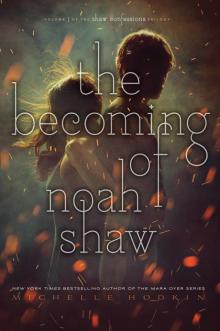 The Becoming of Noah Shaw
The Becoming of Noah Shaw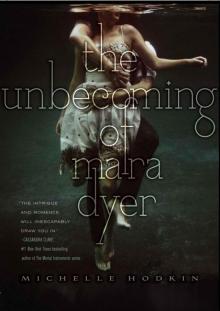 The Unbecoming of Mara Dyer
The Unbecoming of Mara Dyer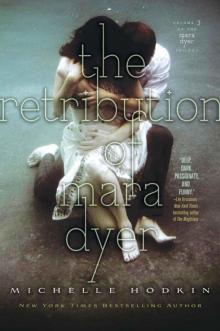 The Retribution of Mara Dyer
The Retribution of Mara Dyer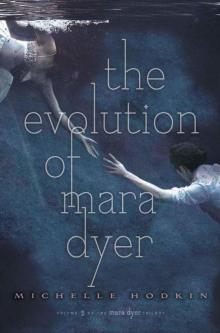 The Evolution of Mara Dyer
The Evolution of Mara Dyer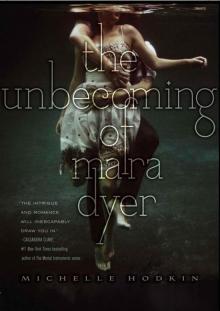 The Unbecoming of Mara Dyer md-1
The Unbecoming of Mara Dyer md-1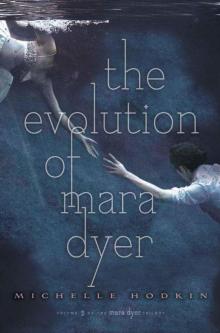 The Evolution of Mara Dyer md-2
The Evolution of Mara Dyer md-2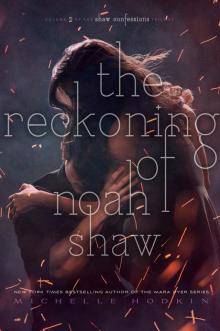 The Reckoning of Noah Shaw
The Reckoning of Noah Shaw